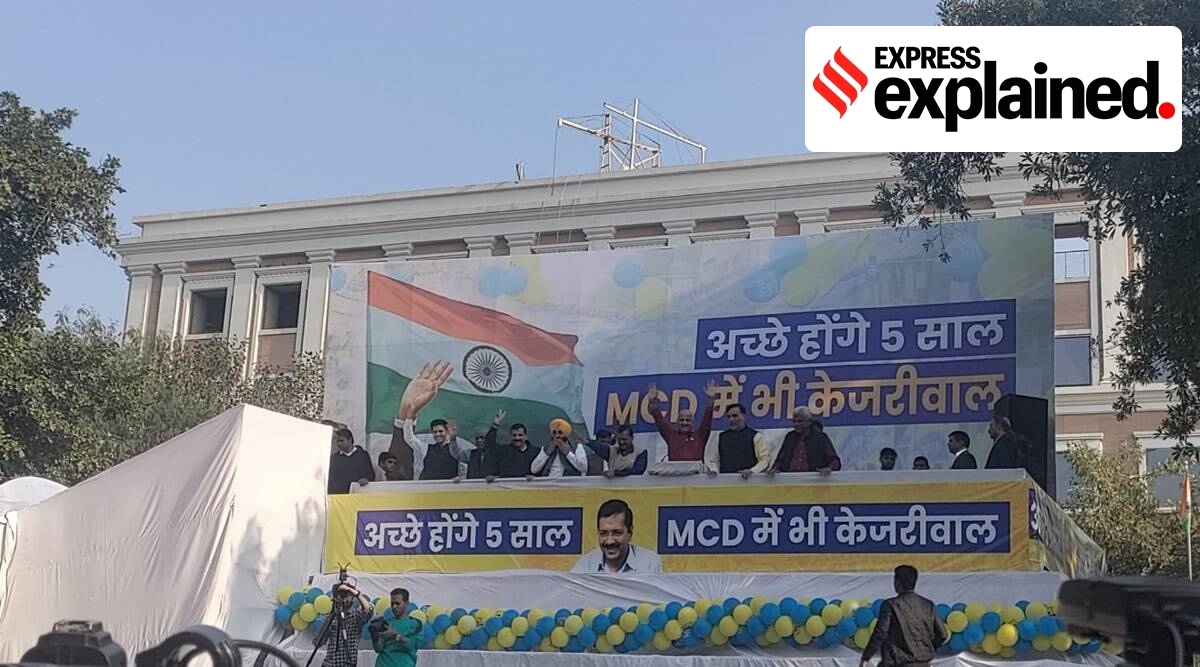Latest Comment
Post Comment
Read Comments
 The appointment of 10 aldermen has become a source of controversy in Delhi's municipal body (Express Photo).
The appointment of 10 aldermen has become a source of controversy in Delhi's municipal body (Express Photo). Yesterday (January 4), Delhi’s Lt. Governor, VK Saxena, nominated 10 aldermen amidst significant controversy. The 10 nominees, all BJP members, are expected to play a crucial role in determining who controls the Municipal Corporation of Delhi (MCD).
In the recent municipal corporation elections, the Aam Aadmi Party (AAP) beat the incumbent Bharatiya Janata Party (BJP) by a slender margin, and mayor elections are due on Friday (January 6). Although they do not have the right to vote in the mayor polls, aldermen hold significant power and play an important role in the elections of Standing Committees, MCD in-house and ward committee meetings. They are a part of a group which effectively controls the MCD’s purse strings.
“Alderman” refers to a member of a city council or municipal body, with exact responsibilities depending on the location of its usage. It is derived from Old English.
Etymologically, the word comes from the combination Old English words for “old” (Anglian, ald or West Saxon, eald) and “man” (monn in Mercian/Anglian or mann in West Saxon).
“Ald/eald” referred to “antique, of ancient origin, belonging to antiquity, primeval; long in existence or use; near the end of the normal span of life; elder, mature, experienced,” according to the Online Etymology Dictionary The term “ald” itself is derived from “al” meaning “to grow, nourish.”
The term for man has a more contested origin, with similar root words found in languages from Sanskrit (manuh) to Russian (muzh).
“Aldormonn” (Mercian) or “ealdormann” (West Saxon) originally referred to elders of a clan or tribe, though soon it became a term for king’s viceroys, regardless of age. Soon, it denoted a more specific title – “chief magistrate of a county,” having both civic and military duties.
As time passed, it became particularly associated with guilds with chiefs/leaders being referred to as aldormonn. In the 12th century CE, as guilds became increasingly associated with municipal governments, the term came to be used for officers of municipal bodies. This is the sense in which it is used till date.
Today, an alderman has different roles in different places.
Until the 19th century, there was no one role/definition of an alderman in Britain. Under the Municipal Reform Act 1835, municipal borough corporations consisted of councillors and aldermen. Aldermen would be elected not by the electorate, but by the council (including the outgoing aldermen), for a term of six years, which allowed a party that narrowly lost an election to retain control by choosing aldermen.
The Local Government Act of 1972 finally abolished Aldermen with voting rights, with effect from 1974, except in the Greater London Council and the London borough councils, where they remained a possibility until 1978.
In the US, depending upon the jurisdiction, an alderman could have been part of the legislative or judicial local government. A “board of aldermen” is the governing executive or legislative body of many cities and towns in the United States.
Historically, in Canada, the term “alderman” was used for those persons elected to a municipal council to represent the wards. As women were increasingly elected to the municipal office, the term “councillor” slowly replaced “alderman”, although there was some use of the term “alderperson”. Today the term is rarely used.
Australia and Ireland have also abolished the term and specific post of an alderman whereas, in South Africa, the term alderman refers to senior members of municipal councils. In Netherlands, the term refers to members of the municipal executive (rather than the council).
As per the Delhi Municipal Corporation Act, 1957, ten people, over the age of 25 can be nominated to the corporation by the administrator (the Lieutenant Governor). These people are expected to have special knowledge or experience in municipal administration. They are meant to assist the house in taking decisions of public importance.
The current controversy regarding the appointment of 10 aldermen has two facets. The first is with regards to the people nominated. After the recommendations were sent to the LG, two of the 10 nominees were found to be technically unfit for the job, forcing the BJP to retract their names to avoid embarrassment. Mahesh Singh Tomar and Kamal Jit Singh were not on the voter list and thus were ineligible.
“BJP national president Jagat Prakash Nadda is understood to be very peeved, and so is national general secretary B L Santhosh. Both are understood to have underlined that not being able to verify the credentials of individuals being nominated for such significant posts is an organisational failure and reflects a disconnect from the grassroots,” a source told the The Indian Express.
Second, the appointment of aldermen by the LG is seen by many as an attempt by the BJP to continue exercising power in the MCD, despite its election loss.
AAP has cried foul, alleging that procedural norms were violated by the LG in choosing the 10 BJP members as aldermen. In a letter to LG Saxena on Thursday, Arvind Kejriwal called the nomination an attempt “to influence the process of elections” to the powerful MCD standing committee.